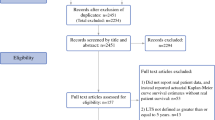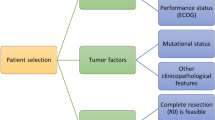Abstract
Purpose
Tumor recurrence after liver resection continues to pose a major problem in hepatocellular carcinoma (HCC). Here we aimed to evaluate prognostic markers for disease-free (DFS) and overall survival (OS) in HCC-patients who underwent liver resection in curative intent. Additionally, we investigated the effects of HCC-recurrence in a subgroup of patients.
Methods
Between 2010 and 2016, 111 patients underwent surgical resection for HCC at our institution. A subgroup of 50 patients showed tumor recurrence (n = 50) during follow-up. The associations of DFS and OS with histopathologic characteristics were assessed using univariable and multivariable Cox regression analyses.
Results
Median DFS was 31 months and median OS was 27 months. Milan criteria (p = 0.045), macrovascular invasion (p = 0.044) and UICC tumor stage (p = 0.003) were independently associated with DFS while macrovascular invasion (p = 0.001) and MELD score (p = 0.010) were independently associated with OS. Tumor recurrence did not show an association with OS (p = 0.228). However, patients with HCC-recurrence who underwent repeat-surgical or interventional treatment showed improved OS compared to patients treated with palliative or sorafenib treatment alone (OS 18 months vs. 2 months; p < 0.001).
Conclusion
Tumor recurrence alone is not associated with poor oncological outcome and repeat liver resections as well as local-ablative procedures may help to improve OS in HCC.


Similar content being viewed by others
Abbreviations
- AFP:
-
Alpha fetoprotein
- ALT:
-
Alanine aminotransferase
- ASA:
-
American society of anesthesiologists
- AST:
-
Aspartate aminotransferase
- BCLC:
-
Barcelona clinical liver cancer staging system
- BMI:
-
Body mass index
- BSC:
-
Best supportive care
- CCI:
-
Comprehensive complication index
- CD:
-
Clavien-Dindo
- cmCT:
-
Contrast-material enhanced computed tomography
- CUSA:
-
Cavitron ultrasonic surgical aspirator
- DFS:
-
Disease-free survival
- ECOG:
-
Eastern Cooperative Oncology Group
- FFP:
-
Fresh frozen plasma
- FLR:
-
Future liver remnant
- GGT:
-
Gamma glutamyltransferase
- HCC:
-
Hepatocellular carcinoma
- HIDA:
-
Hepato-imino diacetic acid
- ICG:
-
Indocyanine green
- INR:
-
International normalized ratio
- IRE:
-
Irreversible electroporation
- LiMAx:
-
Maximum liver function capacity
- MELD:
-
Model of end stage liver disease
- MRI:
-
Magnetic resonance imaging
- MVI:
-
Macrovascular invasion
- MWA:
-
Microwave ablation
- OLT:
-
Orthotopic liver transplantation
- OS:
-
Overall survival
- RFA:
-
Radiofrequency ablation
- RWTH:
-
Rheinisch-Westfälische Technische Hochschule
- SIRT:
-
Selective internal radiation therapy
- TACE:
-
Transarterial chemoembolization
- UH-RWTH:
-
University Hospital RWTH Aachen
- UICC:
-
Union for international cancer control
References
Siegel R, Naishadham D, Jemal A (2012) Cancer statistics for Hispanics/Latinos, 2012. CA Cancer J Clin 62:283–298
Llovet JM, Burroughs A, Bruix J (2003) Hepatocellular carcinoma. Lancet 362:1907–1917
Lurje G, Lesurtel M, Clavien PA (2013) Multimodal treatment strategies in patients undergoing surgery for hepatocellular carcinoma. Dig Dis 31:112–117
Czigany Z, Schoning W, Ulmer TF, Bednarsch J, Amygdalos I, Cramer T, Rogiers X et al (2017) Hypothermic oxygenated machine perfusion (HOPE) for orthotopic liver transplantation of human liver allografts from extended criteria donors (ECD) in donation after brain death (DBD): a prospective multicentre randomised controlled trial (HOPE ECD-DBD). BMJ Open 7:e017558
Slankamenac K, Breitenstein S, Held U, Beck-Schimmer B, Puhan MA, Clavien PA (2009) Development and validation of a prediction score for postoperative acute renal failure following liver resection. Ann Surg 250:720–728
Poon RT, Fan ST, Lo CM, Ng IO, Liu CL, Lam CM, Wong J (2001) Improving survival results after resection of hepatocellular carcinoma: a prospective study of 377 patients over 10 years. Ann Surg 234:63–70
Malinowski M, Jara M, Luttgert K, Orr J, Lock JF, Schott E, Stockmann M (2014) Enzymatic liver function capacity correlates with disease severity of patients with liver cirrhosis: a study with the LiMAx test. Dig Dis Sci 59:2983–2991
Imamura H, Seyama Y, Kokudo N, Maema A, Sugawara Y, Sano K, Takayama T et al (2003) One thousand fifty-six hepatectomies without mortality in 8 years. Arch Surg 138:1198–1206 discussion 1206
de Graaf W, van Lienden KP, Dinant S, Roelofs JJ, Busch OR, Gouma DJ, Bennink RJ et al (2010) Assessment of future remnant liver function using hepatobiliary scintigraphy in patients undergoing major liver resection. J Gastrointest Surg 14:369–378
Nguyen KT, Marsh JW, Tsung A, Steel JJ, Gamblin TC, Geller DA (2011) Comparative benefits of laparoscopic vs open hepatic resection: a critical appraisal. Arch Surg 146:348–356
Clavien PA, Petrowsky H, DeOliveira ML, Graf R (2007) Strategies for safer liver surgery and partial liver transplantation. N Engl J Med 356:1545–1559
Siegel R, Naishadham D, Jemal A (2012) Cancer statistics, 2012. CA Cancer J Clin 62:10–29
Rahbari NN, Mehrabi A, Mollberg NM, Muller SA, Koch M, Buchler MW, Weitz J (2011) Hepatocellular carcinoma: current management and perspectives for the future. Ann Surg 253:453–469
Ercolani G, Grazi GL, Ravaioli M, Del Gaudio M, Gardini A, Cescon M, Varotti G et al (2003) Liver resection for hepatocellular carcinoma on cirrhosis: univariate and multivariate analysis of risk factors for intrahepatic recurrence. Ann Surg 237:536–543
Teh SH, Nagorney DM, Stevens SR, Offord KP, Therneau TM, Plevak DJ, Talwalkar JA, Kim WR, Kamath PS (2007) Risk factors for mortality after surgery in patients with cirrhosis. Gastroenterology 132:1261–1269
Kamath PS, Wiesner RH, Malinchoc M, Kremers W, Therneau TM, Kosberg CL, D'Amico G, Dickson ER, Kim WR (2001) A model to predict survival in patients with end-stage liver disease. Hepatology 33:464–470
Faber W, Sharafi S, Stockmann M, Denecke T, Sinn B, Puhl G, Bahra M, Malinowski MB, Neuhaus P, Seehofer D (2013) Long-term results of liver resection for hepatocellular carcinoma in noncirrhotic liver. Surgery 153:510–517
Hanazaki K, Kajikawa S, Shimozawa N, Mihara M, Shimada K, Hiraguri M, Koide N, Adachi W, Amano J (2000) Survival and recurrence after hepatic resection of 386 consecutive patients with hepatocellular carcinoma. J Am Coll Surg 191:381–388
Andreou A, Bahra M, Schmelzle M, Ollinger R, Sucher R, Sauer IM, Guel-Klein S et al (2016) Predictive factors for extrahepatic recurrence of hepatocellular carcinoma following liver transplantation. Clin Transpl 30:819–827
Yao FY, Mehta N, Flemming J, Dodge J, Hameed B, Fix O, Hirose R, Fidelman N, Kerlan RK Jr, Roberts JP (2015) Downstaging of hepatocellular cancer before liver transplant: long-term outcome compared to tumors within Milan criteria. Hepatology 61:1968–1977
Sapisochin G, Goldaracena N, Laurence JM, Dib M, Barbas A, Ghanekar A, Cleary SP, Lilly L, Cattral MS, Marquez M, Selzner M, Renner E, Selzner N, McGilvray ID, Greig PD, Grant DR (2016) The extended Toronto criteria for liver transplantation in patients with hepatocellular carcinoma: a prospective validation study. Hepatology 64:2077–2088
Shimozawa N, Hanazaki K (2004) Longterm prognosis after hepatic resection for small hepatocellular carcinoma. J Am Coll Surg 198:356–365
Stockmann M, Lock JF, Riecke B, Heyne K, Martus P, Fricke M, Lehmann S, Niehues SM, Schwabe M, Lemke AJ, Neuhaus P (2009) Prediction of postoperative outcome after hepatectomy with a new bedside test for maximal liver function capacity. Ann Surg 250:119–125
Imamura H, Sano K, Sugawara Y, Kokudo N, Makuuchi M (2005) Assessment of hepatic reserve for indication of hepatic resection: decision tree incorporating indocyanine green test. J Hepato-Biliary-Pancreat Surg 12:16–22
Fukuda S, Itamoto T, Amano H, Kohashi T, Ohdan H, Tashiro H, Asahara T (2007) Clinicopathologic features of hepatocellular carcinoma patients with compensated cirrhosis surviving more than 10 years after curative hepatectomy. World J Surg 31:345–352
Franssen B, Jibara G, Tabrizian P, Schwartz ME, Roayaie S (2014) Actual 10-year survival following hepatectomy for hepatocellular carcinoma. HPB (Oxford) 16:830–835
Mise Y, Hasegawa K, Shindoh J, Ishizawa T, Aoki T, Sakamoto Y, Sugawara Y, Makuuchi M, Kokudo N (2015) The feasibility of third or more repeat hepatectomy for recurrent hepatocellular carcinoma. Ann Surg 262:347–357
Kim PT, Jang JH, Atenafu EG, Fischer S, Greig PD, McGilvray ID, Wei AC et al (2013) Outcomes after hepatic resection and subsequent multimodal treatment of recurrence for multifocal hepatocellular carcinoma. Br J Surg 100:1516–1522
Tabrizian P, Jibara G, Shrager B, Schwartz M, Roayaie S (2015) Recurrence of hepatocellular cancer after resection: patterns, treatments, and prognosis. Ann Surg 261:947–955
Vitale A, Burra P, Frigo AC, Trevisani F, Farinati F, Spolverato G, Volk M, Giannini EG, Ciccarese F, Piscaglia F, Rapaccini GL, di Marco M, Caturelli E, Zoli M, Borzio F, Cabibbo G, Felder M, Gasbarrini A, Sacco R, Foschi FG, Missale G, Morisco F, Svegliati Baroni G, Virdone R, Cillo U, Italian Liver Cancer (ITA.LI.CA) group (2015) Survival benefit of liver resection for patients with hepatocellular carcinoma across different Barcelona clinic liver cancer stages: a multicentre study. J Hepatol 62:617–624
Bruix J, Reig M, Sherman M (2016) Evidence-based diagnosis, staging, and treatment of patients with hepatocellular carcinoma. Gastroenterology 150:835–853
Funding
This research project is supported by the START-Program (no. 136/17) of the Faculty of Medicine, RWTH Aachen and funded by the Excellence Initiative of the German federal and state governments (G:(DE-82) ZUK2-SF-OPSF443).
Author information
Authors and Affiliations
Contributions
All authors contributed significantly to this manuscript and agree with the content. The authors contributed as followed: study conception and design, GL, JB, UPN; acquisition of data, IA, FM, MF; analysis and interpretation of data, GL, JB, ZC, TFU, CHCD; drafting of manuscript, GL, JB, MF; critical revision of manuscript, CHCD, UPN.
Corresponding author
Ethics declarations
All procedures performed in studies involving human participants were in accordance with the ethical standards of the institutional and/or national research committee and with the 1964 Helsinki declaration and its later amendments or comparable ethical standards. The study was conducted at the UH-RWTH in accordance with the requirements of the Institutional Review Board of the RWTH-Aachen University. Informed consent was obtained from all individual participants included in the study.
Dr. Lurje reports grants from START Program No. 136/17/Faculty of Medicine (RWTH Aachen University), grants from Excellence Initiative of the German federal and state governments, outside the submitted work. All other authors declare no conflict of interest.
Rights and permissions
About this article
Cite this article
Lurje, G., Bednarsch, J., Czigany, Z. et al. Prognostic factors of disease-free and overall survival in patients with hepatocellular carcinoma undergoing partial hepatectomy in curative intent. Langenbecks Arch Surg 403, 851–861 (2018). https://doi.org/10.1007/s00423-018-1715-9
Received:
Accepted:
Published:
Issue Date:
DOI: https://doi.org/10.1007/s00423-018-1715-9




